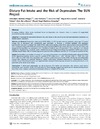Identificador persistente para citar o vincular este elemento:
https://accedacris.ulpgc.es/jspui/handle/10553/19127
| Título: | Dietary fat intake and the risk of depression: The SUN Project | Autores/as: | Sánchez-Villegas, Almudena Verberne, Lisa de Irala, Jokin Ruiz-Canela, Miguel Toledo, Estefanía Serra-Majem, Luis Martínez-González, Miguel Angel |
Clasificación UNESCO: | 3206 Ciencias de la nutrición | Palabras clave: | Depression Diet Fat SUN Project |
Fecha de publicación: | 2011 | Proyectos: | Papel de la Ingestión de Ácidos Grasos Omega-3 y de la Actividad Física en la Prevención de la Depresión Red Alimentación Saludable en la Prevención Primaria de Enfermedades Crónicas: la Red Predimed. (Retics 2006) |
Publicación seriada: | PLoS ONE | Resumen: | Emerging evidence relates some nutritional factors to depression risk. However, there is a scarcity of longitudinal assessments on this relationship.Objective: To evaluate the association between fatty acid intake or the use of culinary fats and depression incidence in a Mediterranean population.Material and Methods: Prospective cohort study (1999-2010) of 12,059 Spanish university graduates (mean age: 37.5 years) initially free of depression with permanently open enrolment. At baseline, a 136-item validated food frequency questionnaire was used to estimate the intake of fatty acids (saturated fatty acids (SFA), polyunsaturated fatty acids (PUFA), trans unsaturated fatty acids (TFA) and monounsaturated fatty acids (MUFA) and culinary fats (olive oil, seed oils, butter and margarine) During follow-up participants were classified as incident cases of depression if they reported a new clinical diagnosis of depression by a physician and/or initiated the use of antidepressant drugs. Cox regression models were used to calculate Hazard Ratios (HR) of incident depression and their 95% confidence intervals (CI) for successive quintiles of fats.Results: During follow-up (median: 6.1 years), 657 new cases of depression were identified. Multivariable-adjusted HR (95% CI) for depression incidence across successive quintiles of TFA intake were: 1 (ref), 1.08 (0.82-1.43), 1.17 (0.88-1.53), 1.28 (0.97-1.68), 1.42 (1.09-1.84) with a significant dose-response relationship (p for trend = 0.003). Results did not substantially change after adjusting for potential lifestyle or dietary confounders, including adherence to a Mediterranean Dietary Pattern. On the other hand, an inverse and significant dose-response relationship was obtained for MUFA (p for trend = 0.05) and PUFA (p for trend = 0.03) intake.Conclusions: A detrimental relationship was found between TFA intake and depression risk, whereas weak inverse associations were found for MUFA, PUFA and olive oil. These findings suggest that cardiovascular disease and depression may share some common nutritional determinants related to subtypes of fat intake. | URI: | https://accedacris.ulpgc.es/handle/10553/19127 | ISSN: | 1932-6203 | DOI: | 10.1371/journal.pone.0016268 | Fuente: | PLoS One [ISSN 1932-6203], v. 6 (1), e16268 (Enero 2011) | Derechos: | by-nc-nd |
| Colección: | Artículos |
Citas SCOPUSTM
204
actualizado el 08-jun-2025
Citas de WEB OF SCIENCETM
Citations
189
actualizado el 22-feb-2026
Visitas
332
actualizado el 15-ene-2026
Descargas
225
actualizado el 15-ene-2026
Google ScholarTM
Verifica
Altmetric
Comparte
Exporta metadatos
Los elementos en ULPGC accedaCRIS están protegidos por derechos de autor con todos los derechos reservados, a menos que se indique lo contrario.
